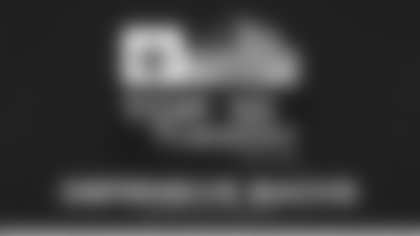New Orleans Saints General Manager Mickey Loomis
Pre-Draft Media Availability
Wednesday, May 7, 2014
Opening Statement
"First of all, I want to start by making sure that I acknowledge and express my appreciation to our college scouting staff, our pro scouting staff, our coaches who have put in a lot of time. They've watched a lot of tape and they've written a lot of reports in order to get us prepared for Thursday night, Friday, and Saturday. I just can't express how much I appreciate those guys, the work that they do and how good they are at their jobs. It certainly makes my job and Sean's (Payton) job much easier because of the work that they do."
How do you feel about the draft being pushed back two weeks this year?
"I don't think we like it, and yet I can't really point to anything and say, 'This is why we don't like it.' I don't like the idea of our scouts and our people missing out on Mother's Day activities on Sunday because they're here and not at their homes, for those guys that live outside of New Orleans. That's the one thing I can say about this particular weekend. In terms of extra time, yeah, I don't really like it, but there's nothing I can point to and say, 'Yeah, this is exactly why I don't like it.'"
In what ways is this draft considered deeper than those in the past?
"I don't know that it is, except it feels a little deeper. I think partly because of the number of juniors in this draft that have declared. Other than that, I kind of look at it as just another year type of thing. Obviously there's different positions of strength, but every year there are positions that are stronger than others so it's no different in that regard."
How hard is it at the 27th position to go through trial runs and test runs, given the fact that you are so late in the draft?
"Well it's certainly more difficult than it is if you are at five or six. We have a pretty good idea of who the first 12 or 15 guys that are going to come off the board. We have no idea what order obviously, and there's always a surprise or two. We have a pretty good idea of the first half I would call it, then who knows? That part is pretty difficult. We have to be prepared for any and all scenarios."
Do you have a feeling that this draft will have more first round trades than past years?
"No, I wouldn't say that. It wouldn't surprise me just because of all the talk about trades, and yet there's talk every year about trades and the majority of them don't happen. I don't have a feel one way or another, whether that's going to be more active or not."
Is there a position group that you're looking at and would really like to say, 'We're leaving this draft with X, Y, and Z.'?
"Yes. (laughter)"
Would you like to reveal any of those position groups?
"No."
How much do you enjoy this weekend, building a new team, and bringing young talent in?
"I enjoy the process from beginning to end. A large part of that has to do with the people that I work with. I enjoy the people on our staff. I respect their opinions – and we have a lot of guys that are willing to give them. That's the way it should be. I enjoy the process from beginning to end, including the college free agent process after the draft."
Approximately how many prospects visited here?
"I think we used 29 out of our 30 visits if I recall correctly. Then we had our local pro day, which we had I think between 40 and 50 guys that were present. Then we had our 60 interviews at the combine and we had interviews at the Senior Bowl and we had independent interviews both at the combine and Senior Bowl. We've had the opportunity to talk to, really, every draftable player that we have on our board. You start this process, there's 3,000 names, and we're whittling it down to 120 or 130 on our draftable front board, and then we're trying to whittle that down to the 20 or 30 that we'd really like to have for the Saints. It's a pretty extensive process."
Talk about undrafted free agents. How much goes into a guy that you have a feeling is not going to get drafted, and kind of do your homework on that player?
"We pay attention to that. Really, that begins with an area scout who has a belief in a player who he doesn't think is going to get drafted and has one, two or three particular traits that give him an opportunity to be successful in the NFL. At the end of the draft, our guys are standing on the table for a certain group of players. I think we do a good job of recruiting those players. We've had a history of success. We can point to a number of guys on our team that have been given an opportunity by our coaches, regardless of how they got here, to be successful. I think that resonates with the agents and the players who are undrafted."
What has been the key to your relationship with Sean Payton, Ryan Pace, and Rick Reiprish in a sense of hitting on most of your draft picks?
"I think that's communication between the coaching staff and our personnel department and being on the same page as to what we're looking for. I think that's ultimately the key. Our coaches do a great job of developing players, recognizing talent, and being able to utilize the skills that our guys have and putting them in a position to be successful. It's a combination of a lot of things."
Last year you had six undrafted free agents on the roster and two on the practice squad. This year you are without a seventh round draft choice. Does that give you even more time to explore that area and to be more aggressive if you don't have to pay attention to a seventh round pick?
"Maybe a little bit. Not a lot. We pay a lot of attention to the undrafted free agent pool. We talk about it every night once the draft begins. Starting after tomorrow night, we're going to have a discussion about who we think is going to end up undrafted. We have a board with a lot of names on it of players that we don't think will be drafted, yet could get drafted, and what those targets are, how we're going to approach those guys after the draft. We have a plan for it. We have a system that has worked for us, and we'll do it again."
As I understand it, each team has an $80,000 pool to sign undrafted free agents. Does this create more of a level playing field?
"We do have eighty-thousand and change that we can spend in signing bonuses on those players, and it does count against the cap. Everybody has the same amount, so ultimately it depends on how you parcel that money out. You could have one guy worth $80,000 or we could have 16 guys for $5,000 each. Each team does it a little differently. We've done it differently every year, depending on what we think of a particular player. Our goal, typically, is to sign between 10 and 15 of those guys to our roster, and we'll get that done after the draft."
What went into the decision not to give Mark Ingram that fifth-year option?
"That's a financial decision: the amount of the tender versus what the market value for running backs has been. I like Mark. I talked to Mark before we made that decision. I told him it wasn't reflective on what we thought about him. It was just a business decision, a financial decision. We have high expectations for him and I hope he has a great year."
Since 2007, all but one first round pick has been on defense. Is that a coincidence?
"Well it's a coincidence that over the last seven years that it has been one on offense; that's a coincidence. Look, we've had a successful offense and we've struggled on defense at times. So obviously when you go into the draft and you have one side of the ball that's struggling over another, then you tend to look to that side of the ball. So in that sense, it wasn't a coincidence."
It's been spoken as a tendency of you and Sean Payton that you don't draft wide receivers and offensive linemen (in the first round). Has it actually shifted to where you have so much young talent on defense and older players on offense?
"We don't look at it that way. Obviously we pay attention to the composition of our team. I've seen a couple of things about the age of our offense. I'm not concerned about the age of our offense; I'm concerned about the performance of our offense, and it's been pretty darn good. So if you're asking me, 'Am I going to trade our offense for a younger one?' No, we're not."
I guess the reason that you haven't drafted offensive lineman is because you've had so many good in their prime. Are those things that change over time?
"Yeah. Certainly they change. Absolutely they change. And yet, we are always in this business of trying to select the best player available to us. It could be that there wasn't an offensive lineman that we deemed worthy of the pick at the time we selected. There's a lot of variables there, not just what we perceive we need on offense or defense."
The Saints have been one of the most aggressive teams in trading up or down. Is that something you feel about trying to get the maximum value at each pick?
"I think most of the time, teams in general understand the value of a pick. So it's more about, 'Hey, is there a player – that we perceive – that we really want this player? It's a great fit for us. Let's go get them.' As long as we're trading the right value. I don't ever think it's that we're trying to steal somebody's pick or have a one-sided trade, for example. It's more about targeting a player we feel can help us in the short run or long run that's a Saints fit. We've done that."
Can you discuss what it might take to move the 27th pick?
"Well that would take a long time (laughter). Because for every pick that you move, every slot that you move, the cost is different. We have a 15-year history of every trade that has been made in the draft. We have a pretty good sense of if we move 10 spots forward, what that will cost, if we move eight spots back, what we should receive. We have a real good sense of that. We'll have discussions. I'll have discussions with some of my counterparts around the league – in front of us, behind us – just to set the table, whether or not it's a possibility. Ultimately it's not until you're on the clock that you're making those kinds of decisions. But look, both sides, both ends of the phone call have a real good idea of what the value is. It's really not that hard. It's just a matter of, 'Do you want to make a trade?'"
A lot of people think sitting at the 27th pick and people behind you, there will be a lot of activity as far as people wanting to move back in the first round. Have you had many of those discussions?
"No it hasn't been, I wouldn't say it has been more or less. I would say that it is typical conversation before the draft is, hey if you are interested in moving up, we might be interested in moving back and vice versa. You just receive those calls. We are not getting a lot of specific trade opportunities right now and that is not unusual. I wouldn't say that it is any heavier that it has ever been."
Do you think the new CBA will have any effect on teams wanting to trade back into the first round to lock in a player for five years instead of four?
"I don't think so. I don't think of it in those terms. I can't speak as to how the other teams view that, but I don't think of it in terms of that extra year at all. I don't think that has affected the trade scenarios. I do think that particularly the top of the draft with the way the rookie contracts work now, I think that does open up more trade possibilities than we had in the past. I don't perceive that at the end of the first round."
The two weeks extra, does that give you a little extra time medical-wise? Has that been more of the process the last couple of weeks?
"Look, that has always been part of the process. I don't know that the extra time has been more valuable for that reason. Our doctors and the medical teams for all of the clubs do a great job of providing us with really what I think is accurate medical information that we have and plenty of time if the draft would have been at its normal time or now. Obviously it gave us some time to go to Las Vegas. We didn't use it for that medical purpose."
How do you determine who makes the call to college free agents after the draft?
"We have a system that actually Khai Harley is the guy that directs traffic so to speak. We are having a number of guys at every position because we have positions and slots to fill. We may have two corners, three receivers, two offensive linemen and so we have it assigned so that we are making five or six contacts at a particular position but we only have two slots available because of the roster limitations. So we have to manage that properly. We have a priority of guys in the order that we want them and yet sometimes you have an agreement with your fourth rated guy and the first and second haven't decided yet, well you have to take the fourth because you don't want to be left empty handed. It is a process that has to be managed and Khai, and Ryan Pace, and Rick Reiprish do a great job doing that. Everyone is involved. Our coaches are involved, our scouts are involved, I'm involved, at every level whether that's recruiting, negotiating, or identifying the players."
Do you remember the most you have ever paid someone for a signing bonus in free agency? Has it ever gone up to $40,000?
"Yes, well it did when I was in Seattle and that was a long time ago. That is more difficult to do now with this $80,000 limit we have, but before when we didn't have a limit, yeah it could get up there pretty significantly."
Do you think the Las Vegas trip was a good way to kind of refocus and not talk about the draft for a few days?
"Look, that is a trip that Sean (Payton) and I have done with our staff every year and we have always done it on this weekend. It just happened that the draft, in years past that trip was after the draft and this year because of the time schedule it ended up being before. So it had nothing to do with, absolutely nothing to do with the draft."
What is your opinion about taking the draft on the road?
"I don't know that I have an opinion about it because that isn't going to change what I do. We are going to be here. If it is good for the league and brings positive attention and gives another city a chance to host, then look I don't think there is anything wrong with that. I am all for it, but as far as what we do here, that won't impact it at all."
How difficult has it been to operate under a tight salary cap and will that affect the way you enter the draft or trying to get more picks?
"No it wouldn't do that. Obviously we have been tight against that cap for years now. We are used to operating in that environment and look I am glad we are operating in that environment because that means we have a good team and we have good players. We are used to it and a part of each offseason is to get us to the point where it doesn't impact what we do in the draft and so we are at that point."
Do you see a trend with big corners now?
"I think that part of that has to do with the success that Seattle had with the bigger corners. We are a copycat league and you look for those guys. They are rare and hard to find. Seattle has done a great job with identifying some guys that maybe are outside the box, the normal box of physical traits at that position and have been very successful with it. But I think they have some rare talents in Richard Sherman and before that (Brandon) Browner. We would like to have that, everyone would, but there are not that many guys at that size that play that position effectively."
You haven't made a lot of deals to stockpile picks. Is there something about having a complete roster that allows you to not have seven or eight draft picks and be comfortable with five or six?
"Yeah, well we need them. I wouldn't say that we don't need them, it is just that we've had opportunities to trade often times later round picks for players that can have more of an immediate and shorter term impact and we have done that. Look, we know there is a cost to that in terms of having a younger player that may be a special teams guy for you for a few years and develop into a starter. I think part of our confidence in trading away some of those later picks is the success that we've had in the college free agent market. As it was pointed out, we had six guys on our team last year. A lot of ways I look at those guys as our later round picks and again if we continue to have success doing that then it gives us a little more freedom to trade away a sixth or seventh round pick and either move up or trade for a veteran player."
Does Drew Brees still remain as a possible option if you need to restructure to accumulate more cap room?
"Yeah, sure, absolutely, but we have a lot of guys, not a lot of guys, but some guys in that category that we can restructure. I am trying to avoid restructures and pushing off salary caps into future years. I am trying to avoid that. We have done some of it and look there was good reason to do it, but we are trying to avoid doing that if we can."
Any update on Jimmy Graham?
"There is no update on Jimmy Graham."
How much do the additions to your divisional opponents play into who you draft?
"Not really, we are focused on our own team and look we are aware of what they are doing. We pay attention to what they are doing, but it doesn't necessarily impact how we approach our team."
A lot of fans are concerned about when Drew Brees' career will end. When does the day arrive that you try and find a successor for his position?
"Look we pay attention to that because you want to have someone in the wings that can take over and play for you, but we like what Luke (McCown) has done for us as a backup. We like this prospect Ryan Griffin, but we are always keeping an eye on that. I wouldn't say that it is at the forefront of our minds and yet we recognize Drew's age. But if you talk to Drew he is going to play for a lot longer. That is encouraging."
Have you gone through the offseason thinking about what teams you have to be able to matchup against?
"Look, obviously Seattle is the Super Bowl champion and we lost to them twice this season so we have to find a way to be able to compete with them. I think the best way for us is to get homefield advantage and have them play at our Dome. Look, there are a number of really good teams in the NFC, San Francisco and even in our own division, Carolina, Atlanta, Philadelphia; we have to pay attention to all of them. But in terms of a one specific team, I wouldn't say that we gear ourselves against one specific team."
Looking at your sophomore class, do you think you have them in prominent position?
"I don't know because I haven't really thought about it in that term. I do think this though, often times we have these expectations for rookies and we judge them based upon their first year contributions, more often than not though there is a big leap between years one and two. We got great contributions from a number of rookies last year and yet I, just based upon history, (we) expect more from those guys this year than we received a year ago. I think there's a big leap to be made. I am looking forward to seeing that."
With information coming out about players days before the draft, how much does that affect the way you view certain players?
"Well, look, most of the information that the media receives, we already have. I don't know that there is much of an impact because we already had that information. Sometimes there is something that comes out that we don't know, but obviously we have to factor that in."
At the center position, how realistic is it for a rookie to come play right away?
"I do think that it is difficult and yet it has happened. Obviously when you are drafting a center, intelligence, mental quickness, those are the things that you want to make sure you are high on before you draft a guy to play that position. He can definitely play it. I think for us with two veteran guards in Ben (Grubbs) and Jahri (Evans) it is going to make it easier for a center. With a quarterback like Drew (Brees), who does a lot of the identifications and makes a lot of the calls, that makes it easier, so it definitely makes it possible, probably a little easier with our team than some others."
With (Darren) Sproles gone, do you see a need in the return game?
"Yeah, look, we have some candidates on our current roster and I would say that is accurate, we would love to improve ourselves in that area."









